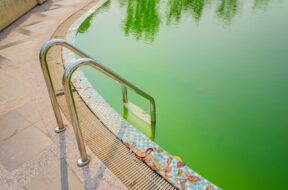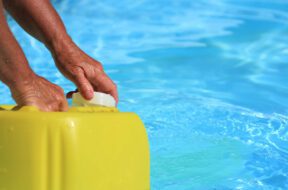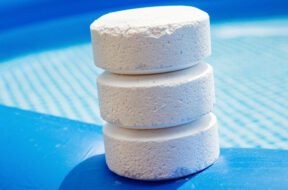
Want to learn more about algaecide? Read on to find out when to add algaecide to your pool maintenance routine and other helpful tips.
Have you ever peed in a swimming pool? Come on, be honest. We’re not pointing fingers, but we know there’s a fair chance you have. There is data out there that even Olympic swimmers are guilty of peeing in the pool.
But here’s the thing: Peeing in the pool is just as easily avoidable as it is unsanitary. You really, honestly, seriously shouldn’t do it – whether you’re in a residential pool, public pool, or your backyard pool at home. Read on to learn why it’s bad to pee in outdoor and indoor pools and get some preventive tips to keep pee out of your pool.
This is a common misconception, and many believe it’s okay to pee in the pool. But when you think for a moment, it doesn’t even make sense.
Yes, chlorine and other pool chemicals will act as disinfectants and kill certain bacteria and algae. But urine isn’t a living substance. It can’t be “killed.” When you pee in the pool, the chlorine doesn’t make it magically disappear. It’s still there, meaning you’re now swimming in a mixture of pee and pool water. That’s probably not your goal here.
People often go to public swimming pools or hot tubs and assume that the water is “extra clean” because of the strong chlorine scent. However, that smell is actually a sign of a significant amount of pee in the water! When you walk into a pool area and get an overpowering chlorine scent, you are actually smelling a gas called trichloramine. This is created by a chemical reaction between chlorine and urine. Trichloramine not only creates a potent odor, but it also is an eye and skin irritant.
So to repeat: Chemicals such as chlorine do not “kill off” or remove urine from your pool water. Chlorine’s reaction with urine creates a gas that can be hazardous to your health. And again, if you pee in the pool, you’re swimming in urine. That’s a rather gross fact.
Let’s break down trichloramines to better understand why peeing in the pool is a hazard to your health.
So we’ve learned that it’s bad for chlorine and urine to come into contact with one another – but how exactly does this create trichloramine? Well, a major component of urine is known as urea, which is responsible for carrying nitrogen from the human body. When this nitrogen-rich substance in urine contacts chlorine, there is a potent chemical reaction. This releases nitrogen chloride – aka trichloramine.
As we mentioned above, trichloramine is a serious health hazard. These are a few of the health problems that it can cause:
Sensitive tissues, like your eyes and skin, are the first to react to the caustic effects of trichloramines. This issue is so common that the Center for Disease Control and Prevention (CDC) has reported on it as an occupational hazard among workers at water parks. Common symptoms can include red, watery eyes, a sore nose and throat, and skin rashes. This can occur after coming into contact with pool water, or simply being near enough to a pool to experience trichloramine gas exposure.
Aside from the eye and skin irritation caused by trichloramines, another hazard of trichloramine gas is respiratory problems – i.e., difficulty breathing. This is especially common and dangerous among people with respiratory conditions like asthma. Inhaling trichloramine gas can trigger an asthma attack, and may significantly worsen the intensity of the attack. Not only does trichloramine impact those with asthma, but it has additionally been shown to cause asthma in professional swimmers who are around swimming pools regularly.
The interaction between chlorine and urine doesn’t just create dangerous trichloramine – it’s also a waste of chlorine. When urine is added to pool water, the chlorine levels fall, allowing more room for bacteria to thrive in the water. In other words, when you pee in the pool, your pool’s chlorine ends up fighting urine instead of killing off dangerous germs. Again, these negative effects of trichloramine have been documented and backed up by the CDC in more than one study.If your pool safety and sanitation is a priority, pee is the enemy.
Now that we’ve established why it’s bad to pee in the pool let’s talk about how you keep it from happening. Here are a few major tips:
In an ideal world, everyone would already know not to pee in your pool. But in the real world, people do it anyway! The best way to get ahead of this issue – as with most public health problems – is to talk about it openly. Make sure swimmers know why it’s bad to pee in the pool. Explain how it creates a health hazard, and why you put so much effort into keeping your pool sanitary.
If someone is peeing in your pool, chances are they do it in other pools, as well, and are not familiar with the consequences. To make a change in our behaviors, awareness needs to come first. Clear communication and education are especially important for children. (More on that shortly.)
“Welcome to our OOL. Notice there’s no ‘P’ in it. Let’s keep it that way!”
If someone’s really determined to pee in your pool, a silly sign won’t stop them. But for everyone else (e.g. forgetful children or adults with a bad habit), it’s a friendly, lighthearted reminder that you really, really don’t want them to pee in the pool. After all, you went to the trouble of hanging a sign. Surely they can go to the trouble of using a proper bathroom. You can even encourage them to take bathroom breaks, but make sure it’s obvious where to find the toilet.
Swimming is fun! And for children – who may be easily distracted and less aware of their bathroom needs – all that fun can make it hard to remember to take a bathroom break (until it’s too late). That’s why scheduling regular swimming breaks is a great option to prevent children from peeing in your pool.
Prior to hopping in the pool, let your children know that every 45 minutes, they’ll need to take a 5-10 minute break to reapply sunscreen, hydrate, and hit the restroom if necessary. Instead of making the entire break focused on using the bathroom, you are more likely to get them out of the water if you make the break about other things – like hydrating, snacking, and avoiding a nasty sunburn, as well.
For whatever reason, and however you found out, someone peed in your pool. So what should you do now?
One word: sanitize. This is the first and most noteworthy step you should take if someone has peed in your pool. You will have to check the chlorine levels in your pool and see how much they have dropped. Not sure how? Get Pool Calculator – a simple, streamlined app that provides everything you need to know around your pool’s chemical levels and maintenance information. Pool Calculator is available for both iOS and Android.
If this is a single or first-time offense, your chlorine levels may not have decreased significantly. However, if you find that the chlorine levels are noticeably and consistently low, you may have a high concentration of pee in your pool that’s an under-the-radar issue. Either way, once you identify how much the chlorine levels have decreased, you can determine how much you will need to add to properly balance your pool chemistry.
In combination with sanitizing and rebalancing your pool chemicals, it is important to make sure that your pool’s filtration system is in good condition and that the circulation system is up and running well. This lets the chlorine that is added to your pool filter and circulate properly, treating any lingering urine in the water. In the long run, sanitizing your pool at the first sign of urine will help you avoid chemical imbalance in your pool water and any related complications.
It is undeniable that people, of all ages, pee in pools. Now that you know the risks associated with peeing in the pool – including eye and skin irritation, respiratory problems, and overall poor sanitation – we hope you’re motivated to fight back! You may not ever be able to completely guarantee that no one pees in your pool. But with the knowledge and handy tips listed above, you are likely to change a few minds – or at the very least make people think twice before taking a tinkle.
Credit: quickmeme
Sources:
https://www.cdc.gov/nceh/ehs/Docs/Investigation_of_Employee_Symptoms_at_an_Indoor_Waterpark.pdf
https://melmagazine.com/en-us/story/where-does-the-piss-go-when-you-piss-in-the-pool
https://www.compoundchem.com/2015/08/12/swimming-pools/
http://www.center4research.org/swimming-pool-safety-dont-pee-pool-worse-gross/
https://www.cdc.gov/healthywater/swimming/swimmers/rwi/chemical-irritants.html

Want to learn more about algaecide? Read on to find out when to add algaecide to your pool maintenance routine and other helpful tips.

In this quick guide, we’ll answer the question “can you over shock a pool” and unveil the factors to consider when shocking a pool.

Maintaining both pH and total alkalinity in your swimming pool is important for keeping your pool properly sanitized and non-corrosive. Total alkalinity is to pH what cyanuric acid is to free chlorine. Total alkalinity stabilizes pH levels. The ideal pool pH level is 7.4 to 7.6. The ideal total alkalinity level is 80 to 120 ppm.

The Association of Pool and Spa Professionals recommends free chlorine levels for both swimming pools and hot tubs be kept between 2.0 and 4.0 ppm. However, the Center for Disease Control recommends free chlorine stay above 1 ppm in pools and 3 ppm in hot tubs.